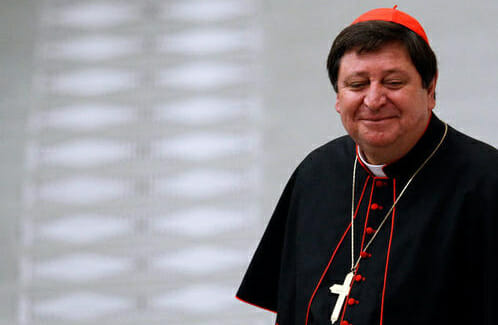 “It was the Son of God, Jesus Christ who revealed to us the true image of God and the true image of man and woman. God is Father, Son and Holy Spirit. We are, therefore, not dealing with three gods but one God in three Persons, as lengthily described in the doctrine of the Trinity. The Church has deepened and preserved this doctrine in all its integrity throughout the centuries. Besides finding the correct language in its profession of faith, the Church has always adored the Three Divine Persons. Up to the present, the spiritual Trinitarian doctrine has shown us the deep relationship the disciples of Jesus had with each of these Three Divine Persons. The Word of God does not present God only as a perfect Spirit, creator of heaven and earth, (as declared in the Christian Doctrine’s Second Catechism), but affirms that “God is love” (1 John 4,8.16). Saint Augustine tried to delve deeper into the path of love in God and reached the point of affirming that God is the Lover, the Beloved, and Love itself. However, he felt incapable of pursuing this path and bequeathed to us the deepening of this mystery in man and woman, in the three qualities of intelligence, memory and will. But what remained to be fully developed was the deeper understanding of the mystery of God who is Love. In our time, in which culture affirms the individual up to the point of falling into an exasperated individualism, and we struggle to make the synthesis between unity and diversity in the human relationships in this globalised world where human relationships are still re-evaluated in all senses, it would be opportune to seek in the Holy Trinity, that essentially Christian foundation, the path towards the fulfillment of love as a human identity. What is love? How can we understand and experience love? Our pathway must be found in the pathway of He who came to us from the womb of the Father, that is, the Son. To meet man, God who is love made himself nothing (Nazareth, Maria, Joseph, Bethlehem, the flight to Egypt. The Cross) (cfr text of Paul to the Philppians 2,5-11). Love passes through the incarnation and the mystery of the resurrection. Love makes itself nothing to be able to meet the other. This is the Kenotic dimension of love. Without this path it would be difficult for man and woman to find that relationship with God, but also with each other, whether man or woman. In this sense I think we could find the Trinitarian path of anthropology, not only theoretically but concretely.”
“It was the Son of God, Jesus Christ who revealed to us the true image of God and the true image of man and woman. God is Father, Son and Holy Spirit. We are, therefore, not dealing with three gods but one God in three Persons, as lengthily described in the doctrine of the Trinity. The Church has deepened and preserved this doctrine in all its integrity throughout the centuries. Besides finding the correct language in its profession of faith, the Church has always adored the Three Divine Persons. Up to the present, the spiritual Trinitarian doctrine has shown us the deep relationship the disciples of Jesus had with each of these Three Divine Persons. The Word of God does not present God only as a perfect Spirit, creator of heaven and earth, (as declared in the Christian Doctrine’s Second Catechism), but affirms that “God is love” (1 John 4,8.16). Saint Augustine tried to delve deeper into the path of love in God and reached the point of affirming that God is the Lover, the Beloved, and Love itself. However, he felt incapable of pursuing this path and bequeathed to us the deepening of this mystery in man and woman, in the three qualities of intelligence, memory and will. But what remained to be fully developed was the deeper understanding of the mystery of God who is Love. In our time, in which culture affirms the individual up to the point of falling into an exasperated individualism, and we struggle to make the synthesis between unity and diversity in the human relationships in this globalised world where human relationships are still re-evaluated in all senses, it would be opportune to seek in the Holy Trinity, that essentially Christian foundation, the path towards the fulfillment of love as a human identity. What is love? How can we understand and experience love? Our pathway must be found in the pathway of He who came to us from the womb of the Father, that is, the Son. To meet man, God who is love made himself nothing (Nazareth, Maria, Joseph, Bethlehem, the flight to Egypt. The Cross) (cfr text of Paul to the Philppians 2,5-11). Love passes through the incarnation and the mystery of the resurrection. Love makes itself nothing to be able to meet the other. This is the Kenotic dimension of love. Without this path it would be difficult for man and woman to find that relationship with God, but also with each other, whether man or woman. In this sense I think we could find the Trinitarian path of anthropology, not only theoretically but concretely.”
Don’t be indifferent to poverty
Don’t be indifferent to poverty




0 Comments